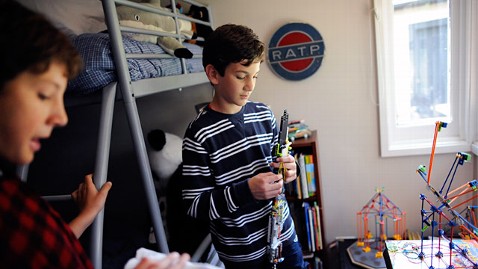Boy Ordered to Transfer Schools for Carrying Cystic Fibrosis Gene Mutation

Courtesy: San Francisco Chronicle
A California middle school has asked that an 11-year-old boy be transferred elsewhere because he carries a mutation of the gene for cystic fibrosis, a life-threatening genetic disease that is not considered contagious. His parents say they will take the issue to court.
School administrators told 11-year-old Colman Chadam he needed to transfer from Jordan Middle School in Palo Alto, Calif., because he was considered a risk to another student at the school who has the disease, the San Francisco Chronicle reported.
"Based on the advice of medical experts, this is the zero risk option, and most certainly helps our District deliver on its commitment to provide safe learning environments," Charles Young, associate superintendent of education service at the Palo Alto Unified School District, said in a written statement to ABC News.
Colman's parents are going to court to dispute the transfer, claiming their sixth grade son poses no threat to the school or other students.
Cystic fibrosis is a genetic lung disease characterized by uncontrollable buildup of mucus in the airways, digestive tract and pancreas.
An estimated 30,000 children and adults have cystic fibrosis, and 10 million more are carriers of the cystic fibrosis genetic mutation but do not have the disease, according to the Cystic Fibrosis Foundation.
Even though Colman has the mutation he poses no heightened risk to children with or without cystic fibrosis or to those who do not have the gene for the disease, experts said.
Exposure between people with the disease can cause bacterial cross-contamination and a higher risk for infections among people who are carriers of the gene or who have the disease, according to a paper published in 2003 by Dr. Lisa Saiman, a professor of clinical pediatrics at Columbia University Medical Center in New York. But carriers of the single gene mutation who do not have the disease are not considered a risk.
School administrators said the school already had a student with cystic fibrosis before Colman arrived.
Colman's mother, Jennifer Chadam, told the San Francisco Chronicle she listed Colman's genetic condition on his school health form. She said he has previously attended two other schools with children who have cystic fibrosis.
"They made this decision without seeing one medical record on my son," Jennifer Chadam told the Chronicle.
According to Dr. John LiPuma, director of the Cystic Fibrosis Foundation Burkholderia cepacia Research Laboratory and Repository at the University of Michigan, there are many children who carry genes for a disease they will never go on to develop.
"Given this school's strategy, they would need to reassign about 5 percent of their student body to another school," he said.
But Young said the administration said they are not willing to take chances.
"The harsh reality of a busy middle school campus, where students ranging in ages from 12 to 15 share a cafeteria, restrooms, the gym and locker room, a library and other settings, is that it might be virtually impossible to maintain a specified separation and sanitation protocols at all times," Young wrote.
Children with cystic fibrosis can attend the same school as long as they are not placed in the same classroom or stay at least three feet away from each other, according to infection control guidelines from the Cystic Fibrosis Foundation.
However, LiPuma said, with proper hygiene, it's highly unlikely that any infection will occur, even if students come in close contact.
"These people do not have CF and should not be treated differently based on having a single gene," said LiPuma. "To do otherwise is simply acting contrary to facts, borne out of ignorance or malice."
School administrators requested that Colman be transferred to Terman Middle School, which is located in the same school district. The court case to determine whether the transfer is justified is scheduled for Oct. 25.